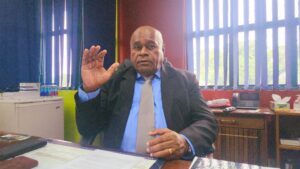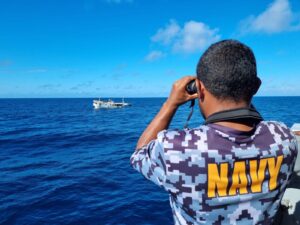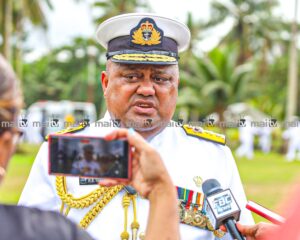USAID today in Suva launched a partnership aimed to enhance Pacific Island Countries’ access to reliable, affordable, and secure digital connectivity.
In launching the Digital Connectivity and Cybersecurity Partnership (DCCP – Pacific) at the USP ICT Centre, USAID Assistant Administrator Michael Schiffer said by the end of the 4-year project they hope to get more people in the region connected and have access to efficient digital services.
“Through DCCP-Pacific we will facilitate investments in broadband connectivity and digital government transformation, promote community-level solutions, and leverage traditional and non-traditional technologies, such as low-earth orbit satellite access, to enhance digital connectivity so that more Pacific Islanders can access secure Internet and participate in the digital economy.”
Schiffer said the DCPP-Pacific partnership promises benefits for PICs extend far beyond improving connectivity in the region and to the work, but also drive economic growth and empower Pacific islanders.

(From left-right): USP vice-chancellor Professor Pal Ahluwalia, USAID Assistant Administrator Michael Schiffer, Fiji’s Deputy Prime Minister Manoa Kamikamica, and Forum Secretariat Secretary-General Dr Henry Puna
The launch garnered support from various figures including USP vice-chancellor Professor Pal Ahluwalia, Fiji’s Deputy Prime Minister Manoa Kamikamica, and Forum Secretariat Secretary-General Dr Henry Puna, who each cited digital including cybersecurity challenges they grapple with, expressing optimism that the DCPP-Pacific would resolve these issues.
Professor Pal stressed the challenge of providing reliable internet access across 14 campuses in 12 PICs and addressing frequent cybersecurity threats, numbering over a million on a weekly basis. He also praised USAID’s approach in partnering with Pacific consultants in rolling out the project.
Kamikamica highlighted Fiji’s significant progress in expanding digital connectivity to cover 95% of the population, which includes ongoing testing for the introduction of 5G broadband. However, he pointed out a drawback: despite these advancements, the remaining 5% of Fiji’s population still lacks adequate connectivity.
To address this gap, the ministry has identified 420 remote and maritime communities falling within this category. They have enlisted the help of provincial offices to locate additional communities. The aim is to ensure that the expansion efforts are comprehensive, covering entire provinces rather than just a few scattered villages or communities.



Regionally, Dr. Puna says the DCPP-Pacific is timely and aligns with the 2050 Strategy for the Blue Pacific launched last year by Forum leaders. The strategy envisions a resilient Pacific region of peace, harmony and security, social security and inclusion. According to Dr. Puna, the DCCP-Pacific contributes to this vision by providing an affordable, secure, and dependable ICT infrastructure system and operations, serving as a key component for achieving these broader goals.
“Pacific people pay high prices for internet than anywhere in the world. For example in PNG mobile data cost 90% of the average monthly per capita income, significantly more expensive than the global average of only 1%. And I know that the trends exist in other PICs. And yet many of our people live in remote parts of our Blue Pacific continent, outside of the range of our ICT networks. Indeed only 45% of our Pacific population have access to a 4G mobile network or better in 2021 and where we do have good access to these networks we are facing new and rapidly evolving risks to our security,” Puna said underscoring the importance of addressing high costs, limited accessibility, security threats, and the need for comprehensive technological development in the Pacific region.
USAID aims to leverage current investments in the Pacific’s digital landscape, facilitated by an MOU with the University of the South Pacific. The university’s refined ICT connectivity infrastructure, developed over two decades, already connects the 12 DCCP-Pacific member countries through their regional campuses. The 12 PICs are Fiji, FSM, Kiribati, Nauru, Palau, PNG, Marshall Islands, Samoa, Solomon Islands, Tonga, Tuvalu and Vanuatu.
The DCCP-Pacific focuses on two areas – firstly access to meaningful connectivity and digital services and, second, bolstering cybersecurity efforts across Government, the private sector, and communities.
Photos: Ministry of Trade, Co-operatives, SMEs and Communications









